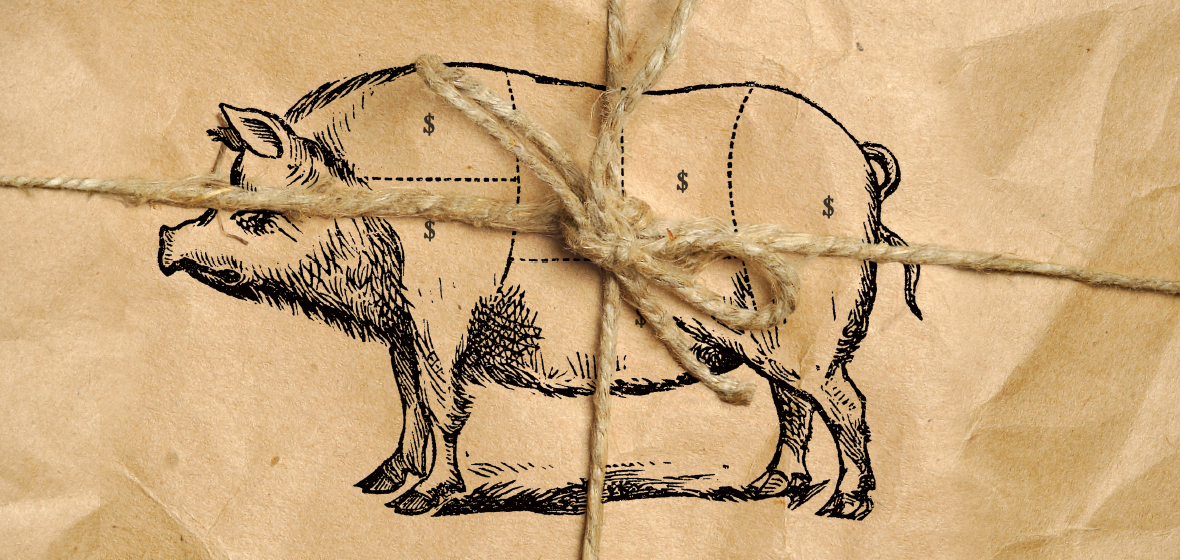If they are not going to clean up their act … then the law is going to have to respond.
It is a practice more than a century old. But as Australia grapples with the standards of behaviour inside Parliament House, has the public’s patience regarding pork barrelling — government cash splashes in marginal seats and treating those who reward them at the ballot box — finally expired? And could a legal framework set the rules of engagement for ministerial intervention?
Staring down the barrel of a fiery parliamentary inquiry, NSW Deputy Premier John Barilaro cast a defiant figure. “I dare you to turn up to these communities and tell them why they don’t deserve these projects,” he declared during questioning over the handling of a $177 million bushfire relief fund.
“What we call pork barrelling is investment … When you think about it, every single election that every party goes to, we make commitments.
“You want to call that pork barrelling; you want to call that buying votes. It’s what the elections are for.”
Yet for some communities – typically non-marginal seats secured by the same party at each election which consistently miss out on access to government funding – it is a high price to pay.
A 2018 analysis of data collected from the Australian Electoral Commission and the Federal Department of Infrastructure revealed marginal electorates receive funding at a rate more than three times higher than that of safe seats. The data traced seven years of funding decisions and found both Coalition and Labor governments engaged in hearty doses of pork barrelling.
“There’s only a limited amount of public money to go around, so if it’s misallocated due to political priorities as opposed to need and merit, then there are losers and they are the members of the community who ought to have been funded but weren’t,” UNSW Scientia Professor and Deputy Vice-Chancellor George Williams tells LSJ.
Unphased as to criticism of the longstanding practice, Barilaro retorted to the parliamentary committee in February: “If we fund a government seat, it’s a rort … if we fund a non-government seat, it’s only because we want to win them at the next election.”
NSW Premier Gladys Berejiklian, whose staff faced a parliamentary inquiry in late 2020 over the allocation of funds in a council grants fund, said pork barrelling was “common parlance” and, “rightly or wrongly”, normal and legal.
“All governments and all oppositions make commitments to the community in order to curry favour,” she said.
But as the Federal Parliament reckons with where it stands on acceptable conduct on a moral – if not legal – front, experts believe the time has arrived to reform the system of public spending, ministerial discretion, and the blurred lines between public service and politicking.
“There is definitely a real upsurge in the willingness of politicians to be quite open about spending public money for political partisan gain and treating that as normalised and acceptable,” Michael Bradley, Managing Partner at Marque Lawyers, tells LSJ.
“Their moral compass has shifted completely.”
At a federal level, the Public Governance, Performance and Accountability Act 2013 (Cth) stipulates that a Minister must not approve the expenditure of public money unless they are satisfied the expenditure would be efficient, effective, economical and ethical. In NSW, Parliamentarians must follow a Code of Conduct and can face the wrath of an ICAC inquiry if evidence emerges that they behaved corruptly.
The trust that the voters place in a government at an election should not be betrayed, particularly regarding the use of taxpayers’ money. It is also a basic principle that a government has an obligation to govern for the whole community, not only those that voted for it.
How long it’s been going on
The term “pork barrelling” is almost 150 years old: first used in an 1863 American story titled “Children of the Public”. In the story’s context, pork barrelling was a positive phrase, describing public spending on the citizenry. By the American Civil War a decade later, it had taken on more negative connotations, used in US Congress to describe certain partisan legislative agendas as “pork barrel bills”.
Closer to home, former NSW Parliament historian David Clune tells LSJ: “Pork barrelling, the use of public funds to gain political advantage, was rife in 19th century NSW politics.”
“In the early 20th century, the development of a rigid two-party system kept MPs under control, reducing the necessity for pork barrelling. There was a consciousness that reform was needed. It was increasingly accepted that old fashioned, naked vote buying was improper and unethical,” he says.
“The electors rightly expect a government to uphold high standards of probity, rather than saying, ‘It’s alright if I can get away with it’.”
Clune sees a difference between MPs “acting as lobbyists for their electorate … a proper part of the democratic process” and “improper politicisation”.
“Governments are … expected to honour their election commitments. However, this does not extend to improper politicisation and secretive allocations to supporters. Checks on pork barrelling are openness, observation of due process and procedures, and proper assessment on merit by the public service.
“The trust that the voters place in a government at an election should not be betrayed, particularly regarding the use of taxpayers’ money. It is also a basic principle that a government has an obligation to govern for the whole community, not only those that voted for it.”
In years gone by, policy was primarily developed by government departments, with a handful of staff in political offices to guide strategy and messaging. Today’s ministerial offices, however, are well stocked with staffers who assume a more hands-on role in approving funding decisions, drafting policy and steering it through the Cabinet and legislative process.
Bradley tells LSJ: “A lot of commentators have been pointing to fundamental structural changes that have progressively taken place within government through the generations, and that shift in power and functioning from public service to political offices is definitely a big one.
“The politicisation of the public service, the gutting of skill and talent from the public service, and also the widespread practice of outsourcing huge parts of the functioning of government to consultants.
“All of these things are contributing to a pretty fundamental breakdown in the ability of government to function in a professional and above-board way. It’s opened up a lot more scope for corruption and just really poor and partisan decision making, and that’s led to the blurring of lines between the public good and what’s good for the party.”
In three- or four-year election cycles, populated by persistent polls about a party’s popularity and prospects, the need for calculated political decision making has become, in some experts’ eyes, far more brazen.
Williams tells LSJ: “There is a self-serving element to this, and that is that politicians want the discretion to allocate money that maximises their political fortunes, particularly in the run-up to elections because they realise the benefits of it.
“I think there have been brazen, surprising and unguarded comments over the past little while and they are quite worrying as well, because we are talking about sometimes naked political interest trumping accountability and community interest. Politicians foster a system that facilitates that, even to the detriment of the community interest. This has real consequences for real people.”
 Michael Bradley, Managing Partner, Marque Lawyers
Michael Bradley, Managing Partner, Marque Lawyers
Game on: the sports rorts scandal
Former federal Minister for Sport Bridget McKenzie resigned over the handling of the $100 million Community Sports Infrastructure Grant program, after a report by the Australian National Audit Office found a bias in funding towards marginal seats and those targeted by the Coalition at the 2019 federal election.
The term “sports rorts” might ring a bell for those who recall the outrage in 1994, when then federal Labor Minister Ros Kelly divvied up funding grants for sporting bodies to marginal electorates held by the party. When questioned in an inquiry as to the rationale behind her decision-making, Kelly said her staff had worked it out “on a great big whiteboard” in the office and then erased it with no permanent record kept. She resigned over the scandal and Labor lost a normally safe seat in the subsequent byelection.
Following her resignation, McKenzie told a senate inquiry into the scheme: “I take responsibility for all the decisions taken in the program.”
Crucially, the report stated it “was not evident” what the legal authority was for McKenzie to make such decisions.
Prime Minister Scott Morrison said in response to the report, “In the Westminster system of parliamentary democracy, it is the Ministers who are accountable to the public. It is Ministers who provide policy leadership and direction.”
The Prime Minister’s own department, Prime Minister and Cabinet (PMC), noted: “the discrepancy between the number of applications recommended by Sport Australia and the final list of approved applications clearly shows the Minister’s Office undertook a separate and non-transparent process in addition to the assessment by Sport Australia.”
Whilst noting that McKenzie “acted within the remit of the guidelines [for the program]”, PMC also highlighted other “significant shortcomings” over the funding allocation including “lack of transparency” and “the disconnect between the assessment process run by Sport Australia and the assessment and decision-making process in the Minister’s Office.”
 Anne Twomey, Professor of Constitutional Law, University of Sydney
Anne Twomey, Professor of Constitutional Law, University of Sydney
Ministers should care about the rule of law and compliance with the Constitution.
Consider the Constitution
Despite frequent assertions from politicians that exercising discretion in funding decisions is entirely legal, many experts dispute this.
Constitutional law expert Anne Twomey tells LSJ: “There seems to be a growing attitude at both the Commonwealth and State levels that Ministers have complete discretion, particularly in relation to spending public money, and that there is nothing unlawful about them using governmental resources for personal or political gain.
“This, of course, is wrong.
“At the very least, such action will often breach administrative law requirements that govern the actions of decision-makers, but it will also sometimes breach the Constitution, statutory limits on ministerial power, finance laws, anti-corruption laws and codes of conduct for Ministers and Members of Parliament.”
Twomey believes federal ministers have “taken insufficient care that they are acting in compliance with the Constitution”.
“The approach seems to be one based upon whether it is likely that anyone with standing will challenge the action – if not, the Minister proceeds. [But] Ministers should care about the rule of law and compliance with the Constitution even when it is not likely they will be brought to account before a court,” she says.
Bradley says any criminal offences such as misconduct in public office are “only invoked in really extreme cases” and are often “not a real prospect” in many instances of pork barrelling that do not progress further than a scattering of press coverage and a parliamentary inquiry that might struggle to grab headlines.
“It would need a more robust legal framework to apply a legal standard to replace the political standards, which have failed.”
The idea of imposing standards of behaviour which are morally acceptable to the public – not simply above board legally – has become increasingly topical in recent political discourse.
“At one level, it is clear there has been a very dramatic decline in the values of the major political parties and their application of standards to themselves, particularly at ministerial level,” Bradley says.
“So, then the question is, what do we do about it? And regrettably it means that if they are not going to clean up their act – which clearly they won’t – then the law is going to have to respond.”
Williams believes the rules of engagement around discretion in political funding are “vague, not well constrained and deliberately manufactured to enable pork barrelling”.
“It’s the politicians both making the rules and then following them to their own advantage,” he tells LSJ.
Despite landmark High Court rulings [in Pape v Commissioner of Taxation and Williams v Commonwealth] that governments have stepped beyond the reach of their executive power in allocating funding, Williams believes enforcement of ministerial guidelines remains “the largest part of the problem”.
“Because we see political scandals, but how often does it go beyond the politics to legal consequences?” he asks.
“I don’t see constitutional impediment to improving the system. I think it’s quite possible to set better criteria, improve enforcement without running into any problems. It’s quite different to political donations or some other areas. The impediment is actually not a legal one – it’s one of political will and for politicians to try to put the public interest over their political interest.”
 George Williams, Vice-Chancellor, University of New South Wales
George Williams, Vice-Chancellor, University of New South Wales
It’s the politicians both making the rules and following them to their own advantage.
Where to from here?
A considerable amount of taxpayer money is already invested into the community by government departments, separate to the political process.
“The point is you simply don’t need a minister exercising personal and political discretions to hand out money when it should be handed out on the basis of merit and need,” Williams says.
“Another thing would be a better understanding of when perhaps [discretion] shouldn’t be vested in a politician. Sometimes yes, but other times maybe it should be vested in an independent expert agency that is there to weigh up the merits of the different positions and actually won’t be influenced by the political considerations. And that’s often desirable for many of the schemes.”
The scandal over the Sport Australia grants and McKenzie’s intervention has not waned entirely since her resignation, and only added volume to calls for a federal anti-corruption body.
The draft legislation for a new Commonwealth Integrity Commission is still in its consultation stage, but many, including the Law Council of Australia, believe the proposal has “significant shortcomings … in the scope of corruption it can investigate” and should be “substantively revised” to ensure its effectiveness.
Former NSW DPP Nicholas Cowdery has also advocated for a federal integrity commission “that actually has bark and bite”.
Given many politicians defend the notion of pork barrelling by championing their accountability to the public, Bradley believes fear of the polls and electoral defeat might be the catalyst for change.
“I think it has an analogy with what’s happening with federal politics [in recent weeks] where there is a sense that it is suddenly cutting through: that sense of disgust with what’s going on. It is starting to penetrate into the broader public consciousness, and if that comes out that will drive a response from the political class because they’ll be forced to do so,” he says.
“Pork barrelling is the same thing. At some point it will become so disgusting and smelly … it will get to a point where people start to take notice and care, and that’s when you’ll get a response. But not before then. If they feel they are getting away with it then they are not going to change.”




